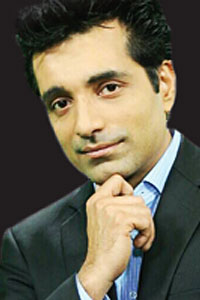
A common theme of two elder statesmen who were in Bangkok on Thursday to attend the Bangkok Post's first international forum was that leaders need to be in power longer than just one term of 4-5 years so that the policies they implement are longer-term in nature and can help countries move forward.
There is no doubt that almost every living soul in Thailand would agree that governments should have policies that are more long-term in nature. This vision has become ever more crucial in today's rapidly changing environment.
Singapore's Emeritus Senior Minister Goh Chok Tong and Malaysia's former prime minister and a legend in his own right, Mahathir Mohamad, both favour leaders having a longer lifespan for countries to achieve long-term prosperity.

Umesh Pandey is Editor, Bangkok Post.
Mr Goh went as far as to say that the minimum required is about 14 years, or equal to the time he was Singapore's PM from 1990 to 2004, which was shorter than the 31 years of his predecessor, Lee Kwan Yew. Mr Goh's successor and Mr Lee's son, Lee Hsien Loong, has been in office since 2004 and completed his 13th year on Aug 12.
Mr Mahathir was PM of Malaysia for 22 years until 2003. He aimed for Malaysia to become a developed nation by 2020 but since he left office that 2020 goal has been pushed back to 2030 and, according to Mr Mahathir, this could be pushed to 2050, 2080 or 2300 if the policies keep changing.
The two leaders, who were in Bangkok at the invitation of the Bangkok Post to mark the 50th anniversary of the formation of the 10-member Asean group, also said the bloc needs to have a "club-like atmosphere" where leaders know each other well in order to resolve many issues.
Only Cambodia's Hun Sen with 32 years has had a longer reign than these two leaders, while many leaders tend to be in office for one term or less, which does not give them the feeling of getting to know each other well enough to have frank conversations.
"We knew each other very well -- we were friends," Mr Mahathir said. "Now, every time you have a meeting of Asean, you see different faces. One term is not enough to develop good friendships."
In Mr Mahathir's era, Mr Lee of Singapore and Indonesia's Muhammad Suharto were both in power for 31 years, but these days it has become far more difficult for leaders to last their term in office.
In Malaysia, where Najib Razak has been the premier for the past eight years and where an election is due by August next year, there are fears that Mr Mahathir's opposition party could make major gains, pushing Mr Razak into a corner.
In the Philippines, Rodrigo Duterte, who took office last year and whose term ends in 2022, has been witnessing a sharp decline in his popularity, while Indonesia's Joko Widodo took office in 2014 and has a five-year term. In Myanmar, Aung San Suu Kyi's party won the polls last year for a five-year term but has also been losing its charm amid many crises facing her government.
One needs not mention Thailand, where no government since the coup of 2006 has managed to stay in power for its full four-year term, except possibly for this military government that will complete four years in power on May 22, 2018.
The elder statesmen say regular leadership changes hinder long-term strategies for the countries and the region. But one wonders if this is true when nations such as Cambodia and to some degree Laos have had leaders in power for a long time but not much was gained.
This is not to mention Myanmar, which was under military dictatorship for five decades and did not achieve anything. On the contrary, the country was stuck in time while its neighbouring countries surged ahead and made economic gains that make it difficult for Myanmar to catch up to.
It is not necessary to have leaders staying in power forever to make their countries or the region move forward. What is needed is more leaders with the vision and ability to interact with regional and global leaders to push forward the direction they want their country and region to take.
Longevity in power only leads to complacency and possible corruption, as one is witnessing in Malaysia under Mr Najib. If the policies are good enough, most successors will follow them even though the initiator is long gone, as has been the case in Thailand where the 30-baht universal healthcare scheme has been followed ever since its introduction under Thaksin Shinawatra's premiership in 2002.
